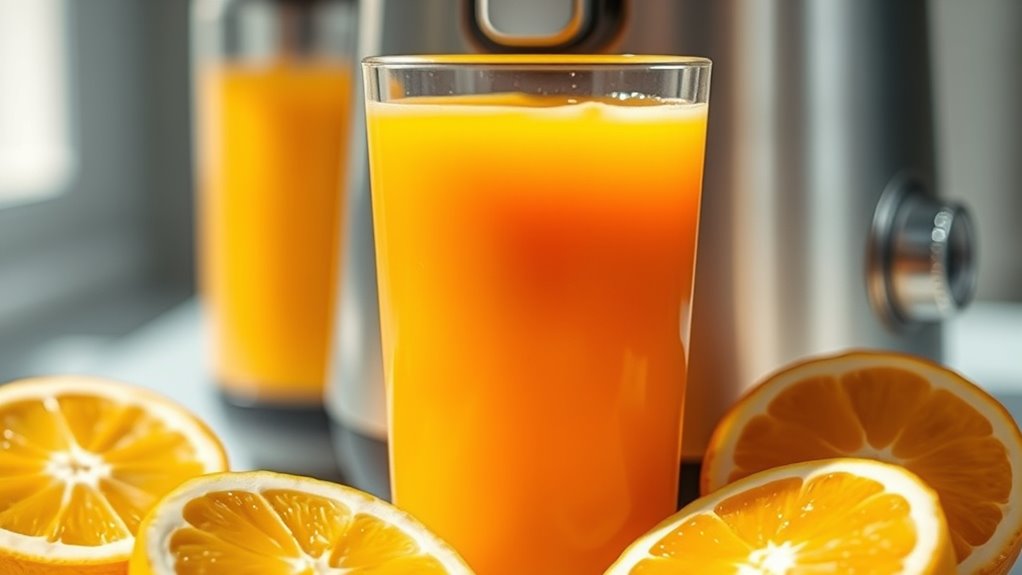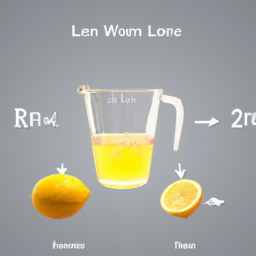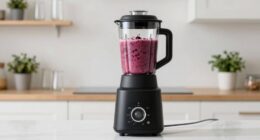Recent research shows many juicing myths are misleading. Juicing doesn’t cause rapid weight loss or replace healthy habits like exercise and balanced eating. It also reduces fiber and can hide high sugar content from fruits, which may impact blood sugar and weight goals. While juices are rich in vitamins if fresh, they shouldn’t be relied on for long-term wellness or as meal replacements. Discover the facts to make informed choices about juicing and health.
Key Takeaways
- Recent research shows juicing doesn’t cause rapid weight loss; quick drops are often due to water loss, not fat reduction.
- Fresh juices retain most vitamins and antioxidants if consumed immediately, but processing and storage can degrade nutrients.
- Juicing reduces fiber intake, which is essential for digestion and blood sugar regulation, limiting long-term health benefits.
- High sugar content in fruit juices can cause blood sugar spikes and undermine weight management efforts.
- Juicing alone cannot replace balanced meals or healthy habits, and sustainable wellness depends on comprehensive lifestyle choices.
Debunking the Myth of Instant Weight Loss From Juicing
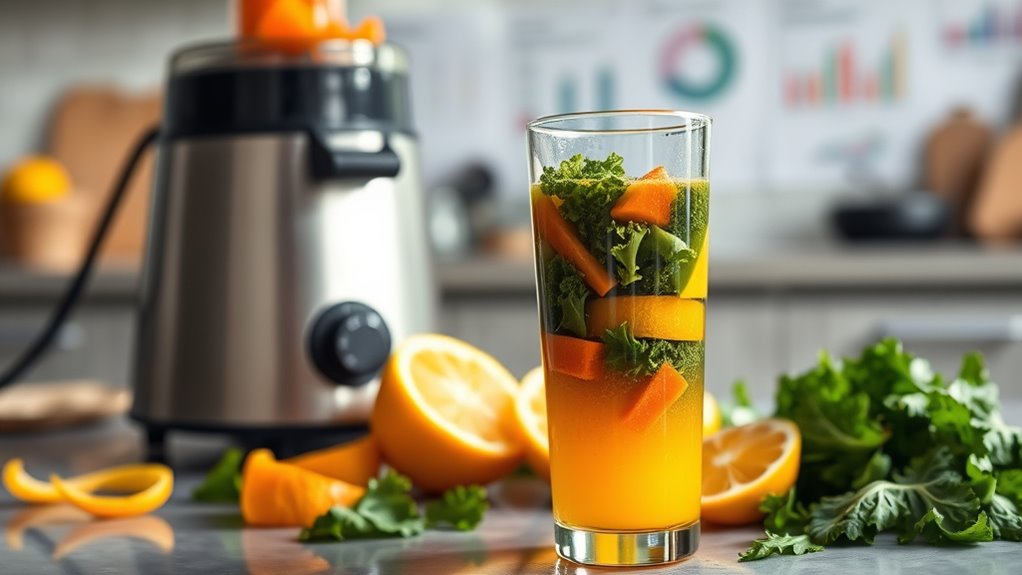
Does juicing really lead to instant weight loss? The truth is, it doesn’t. Many believe that replacing meals with juice cleanses causes quick weight drops, but that’s misleading. Juicing for athletes often involves fresh fruits and vegetables, not artificial sweeteners or sugary drinks. While juices can boost energy and nutrients, they don’t magically melt away fat overnight. Rapid weight loss from extreme juicing can lead to muscle loss and nutrient deficiencies. Plus, some commercial juices contain added sugars or artificial sweeteners, which hinder weight management. Remember, sustainable weight loss requires balanced eating and exercise, not quick fixes. Juicing can be part of a healthy routine, but it’s not a shortcut to instant results. Patience and proper nutrition win in the long run. Additionally, understanding the effects of extreme dieting can help set realistic expectations and promote healthier habits. Exploring evidence-based approaches to weight management emphasizes the importance of consistent, healthy practices over fleeting solutions.
Separating Fact From Fiction on Juice Cleansing and Detoxes
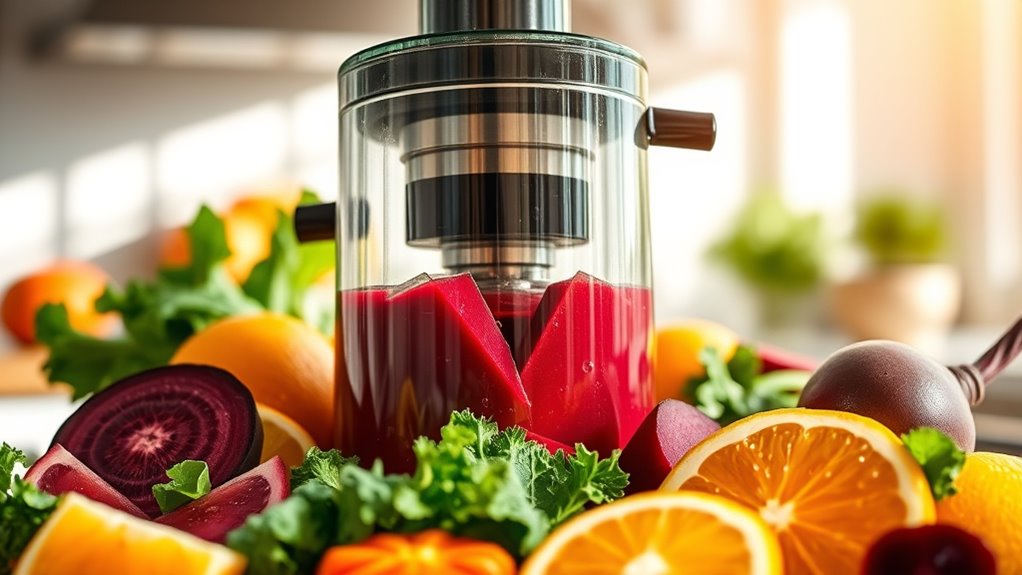
Many people turn to juice cleanses and detoxes expecting quick health benefits, but the reality is often far from the hype. While some believe these routines can rapidly improve your body, research shows they don’t replace healthy habits like moderating alcohol consumption or maintaining regular physical activity. Juice cleanses may temporarily reduce calorie intake, but they rarely support long-term wellness or detoxing your body. Focusing solely on detoxes can lead you to neglect proven strategies, like staying active and reducing alcohol intake, which actually support your health. Instead of relying on quick fixes, prioritize balanced nutrition, consistent exercise, and responsible drinking habits. These approaches are backed by science and promote sustainable health, unlike fleeting juice cleanse trends that often do more harm than good. Additionally, incorporating proper hydration with nutrient-rich foods helps support your body’s natural detoxification processes and overall well-being. Recognizing the importance of nutrient-rich ingredients can enhance the effectiveness of your health routines beyond just juice cleanses. Engaging in mindful eating and healthy habits can further bolster your body’s ability to detox naturally and maintain vitality. Moreover, understanding the role of specific nutrients found in whole foods can maximize your body’s detoxification efficiency. Maintaining a safe environment and avoiding unsafe practices during detox routines can prevent potential health hazards and ensure your efforts are beneficial.
The Truth About Nutrient Loss in Juicing
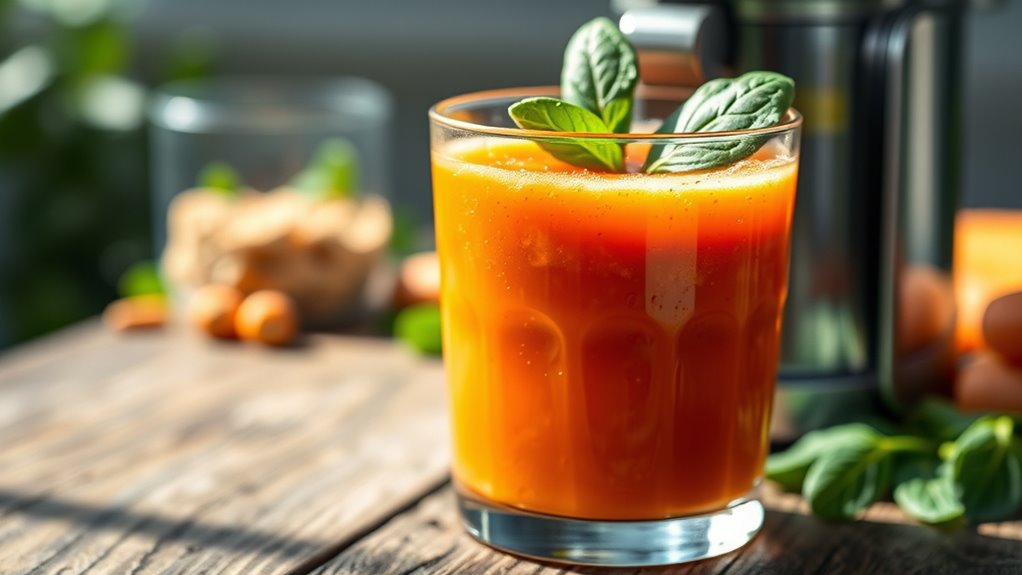
While juicing can be an easy way to increase fruit and vegetable intake, it’s important to understand that some nutrients may be lost during the process. Juicing often reduces fiber retention, especially when pulp is discarded, which means you miss out on the benefits of dietary fiber. However, many nutrients like vitamins and antioxidants remain relatively stable if you juice fresh and consume immediately. Nutrient stability depends on factors like light, heat, and storage time—juice stored too long can degrade essential nutrients. To maximize nutrient retention, use cold-pressed or minimal heat methods and drink your juice soon after extraction. Remember, while some nutrient loss occurs, fresh juice still provides a rich source of vitamins and antioxidants that benefit your health.
Is Juicing a Sufficient Meal Replacement?
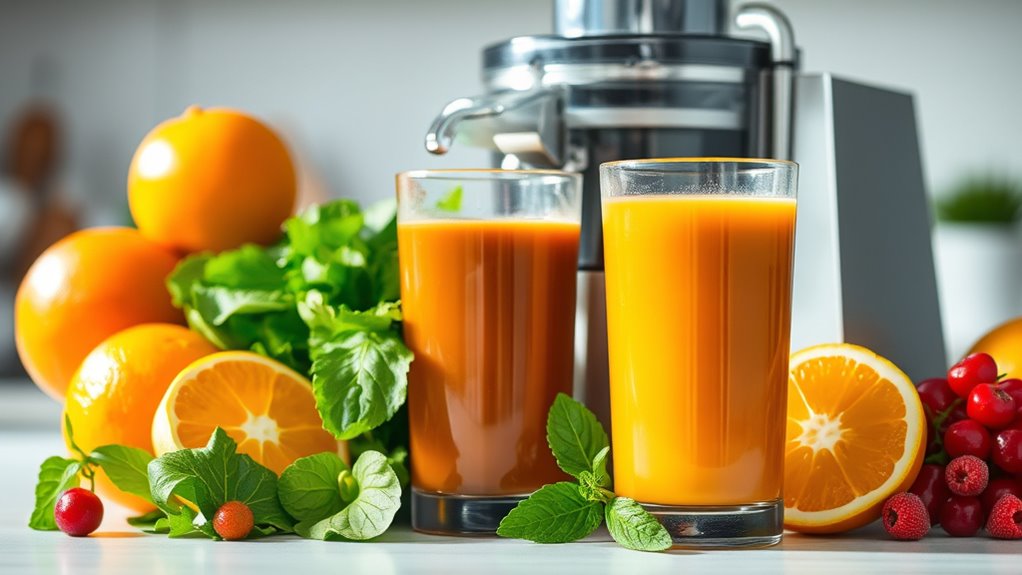
Juicing can be a quick and convenient way to boost your nutrient intake, but relying on it as a full meal replacement often falls short of meeting your nutritional needs. While juice variety offers a colorful array of vitamins and antioxidants, it lacks essential fiber benefits that help keep you full and support digestion. A balanced meal includes proteins, healthy fats, and fiber, which juices alone can’t provide. To visualize, consider this table:
| Nutrients | Juicing Benefits | Missing Components |
|---|---|---|
| Vitamins | Abundant | Protein, fiber |
| Antioxidants | High | Healthy fats |
| Hydration | Excellent | Satiety, sustained energy |
| Fiber benefits | Limited | Digestive health |
| Meal satisfaction | Often lacking | Fullness, muscle repair |
In short, juice alone isn’t enough for a complete meal.
Addressing the Sugar Content in Fruit Juices
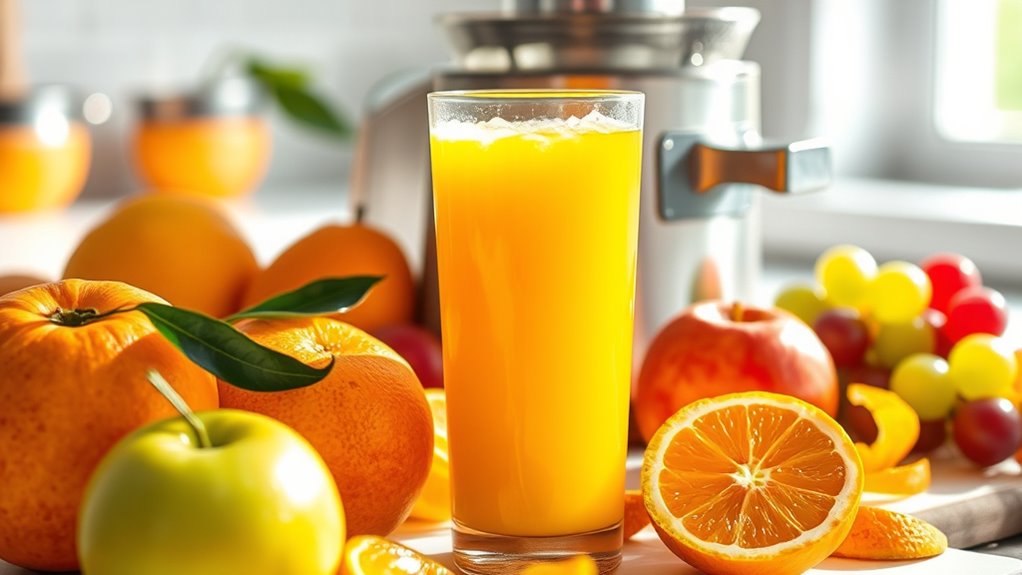
Fruit juices can be tempting as a quick way to boost your vitamin intake, but their natural sweetness often masks a hidden downside: high sugar content. The fruit sugar in juices, mainly fructose, can lead to spikes in your blood sugar levels, especially if you consume large portions. Juice sweetness isn’t just a pleasant flavor—it’s a sign of concentrated natural sugars. Drinking too much juice can contribute to weight gain, insulin resistance, and other health issues. To better manage sugar intake, opt for smaller servings, choose juices labeled as 100% fruit, or dilute with water. Additionally, reading nutrition labels can help you identify added sugars and make healthier choices. Paying attention to natural indicators like sweetness levels can help you make healthier choices. Being aware of net worth and how it relates to overall health can encourage more mindful consumption of sugary drinks.
The Role of Fiber in Juicing: Myth vs. Reality
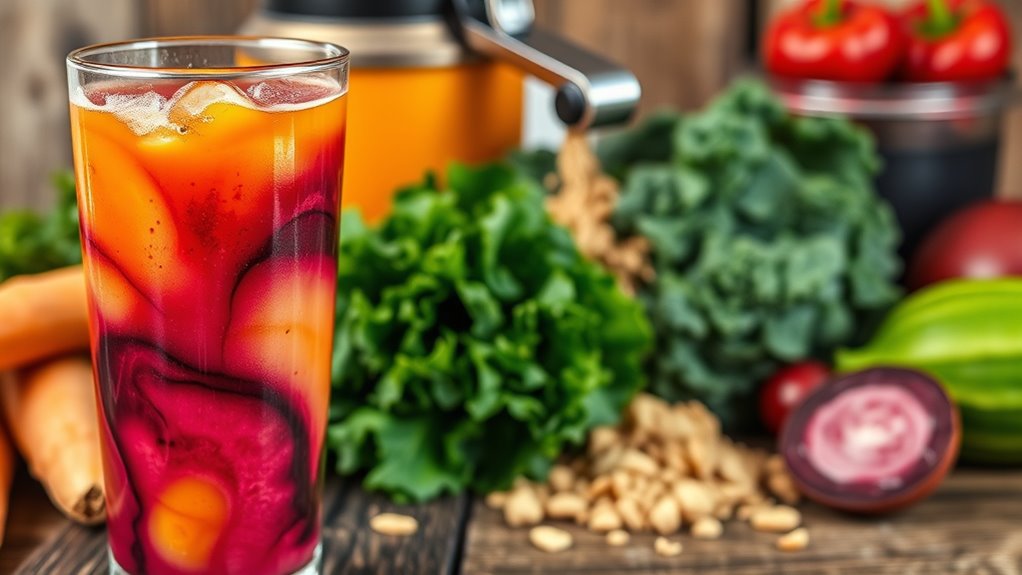
Many people believe that juicing retains all the health benefits of whole fruits, especially the fiber content. However, juice fiber is often lost during the juicing process, reducing its fiber importance. Whole fruits contain fiber in the skin and pulp, which helps regulate digestion and maintain steady blood sugar levels. When you juice, the liquid extracts most of the nutrients but leaves behind much of the fiber. This myth suggests that juice provides the same benefits as eating whole fruits, but that’s not accurate. The fiber importance lies in its ability to slow digestion and promote feelings of fullness. To maximize health benefits, consider eating whole fruits alongside your juice, or include pulp in your juice to retain some of the juice fiber. Additionally, formulated to maintain color vibrancy and shine, some juices contain added fiber or pulp to help preserve these benefits in the beverage. Incorporating fiber-rich ingredients into your juice can further support your health goals, especially since fiber plays a crucial role in overall health and digestion. Understanding the nutritional differences between juice and whole fruits can help you make more informed choices for your diet, especially as automated systems continue to influence food processing methods.
Can Juicing Improve Overall Digestive Health?
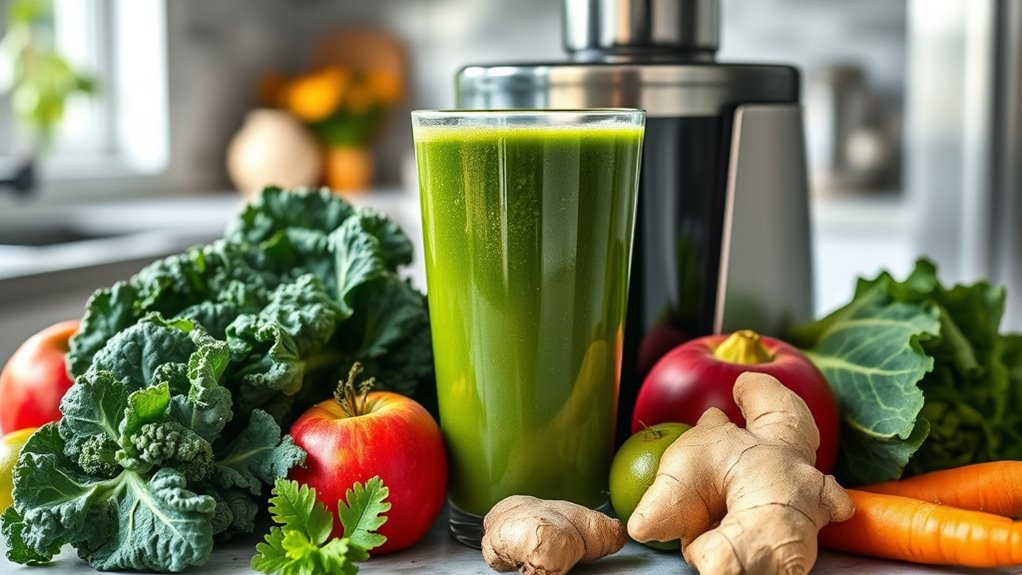
While juicing can introduce beneficial nutrients to your diet, its impact on overall digestive health depends on various factors. Juicing may support gut microbiota by providing vitamins and antioxidants that promote a healthy environment. Additionally, fermented foods or drinks derived from juicing can offer fermentation benefits, encouraging the growth of beneficial bacteria in your gut. However, simply consuming juices without fiber can sometimes hinder digestion or lead to blood sugar spikes, so balance is key. Juicing can help improve digestion if it complements a diet rich in fiber and fermented foods. Incorporating fiber-rich foods and fermented beverages can enhance your understanding of your body’s energy balance and overall wellness. It’s important to remember that maintaining a healthy gut involves multiple factors, including hydration, fiber intake, and overall diet quality. Incorporating a variety of healthy habits can enhance your understanding of your body’s energy balance and overall wellness. Juicing alone isn’t a magic solution but can be part of a gut-friendly lifestyle.
The Impact of Commercial Juices on Your Health
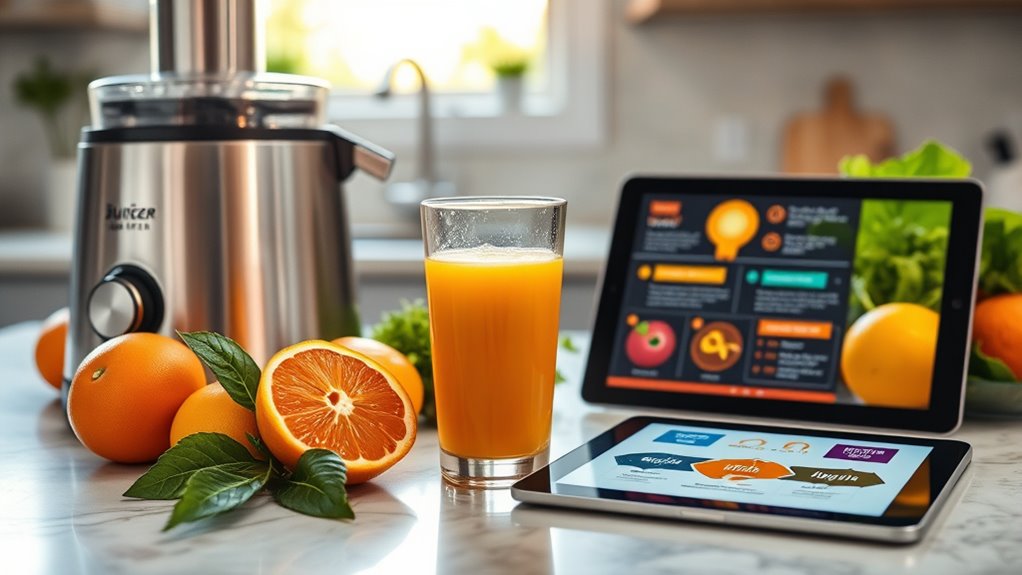
Commercial juices often contain high amounts of added sugars and calories, which can sabotage your health goals. They also include preservatives and additives that may have unwanted effects over time. Plus, the processing can strip away essential nutrients, reducing the juice’s overall benefits.
Added Sugars and Calories
Have you ever checked the nutrition label on a store-bought juice? Many commercial juices contain high levels of added sugars, which substantially increase the product’s caloric impact. These sugars can spike your blood sugar and contribute to weight gain over time. Some brands replace sugar with artificial sweeteners, but these don’t reduce overall calorie content; they just alter the taste. Even if a juice claims to be “natural” or “no added sugar,” it can still be high in naturally occurring sugars that add to your daily intake. Consuming too many added sugars not only boosts your calorie count but also raises your risk of health issues like insulin resistance and obesity. Always read labels carefully to understand what you’re really consuming.
Preservatives and Additives
Ever wondered what’s really in that bottled juice? Many commercial juices contain artificial preservatives and additives designed to extend shelf life. These chemicals can impact your additive health over time. Here’s what you might find:
- Artificial preservatives like sodium benzoate or potassium sorbate, which can cause allergic reactions or other health issues.
- Artificial colors and flavors that mask poor-quality ingredients and may trigger sensitivities.
- Added stabilizers or thickeners that alter the natural composition of juice, potentially affecting digestion.
While these additives keep juice looking fresh and tasting consistent, they often do more harm than good. Regular consumption of products with artificial preservatives can lead to health concerns, making it wise to choose juices with minimal or no additives whenever possible.
Nutrient Loss During Processing
While preservatives and additives can compromise juice quality, processing methods often strip away much of the fruit’s natural nutrients. During commercial processing, vitamin degradation occurs quickly, reducing the levels of vitamin C and other antioxidants. Additionally, mineral leaching can happen when juices are exposed to heat or prolonged storage, causing essential minerals like potassium and magnesium to leach out. This nutrient loss diminishes the health benefits you expect from fresh fruit. Even pasteurization, while necessary for safety, can accelerate vitamin degradation. As a result, store-bought juices may offer fewer nutrients than whole fruits or freshly squeezed options. To maximize your intake, choose minimally processed juices or prepare fresh juice at home, where nutrient retention is better preserved.
Understanding the Limitations of Juicing for Long-Term Wellness
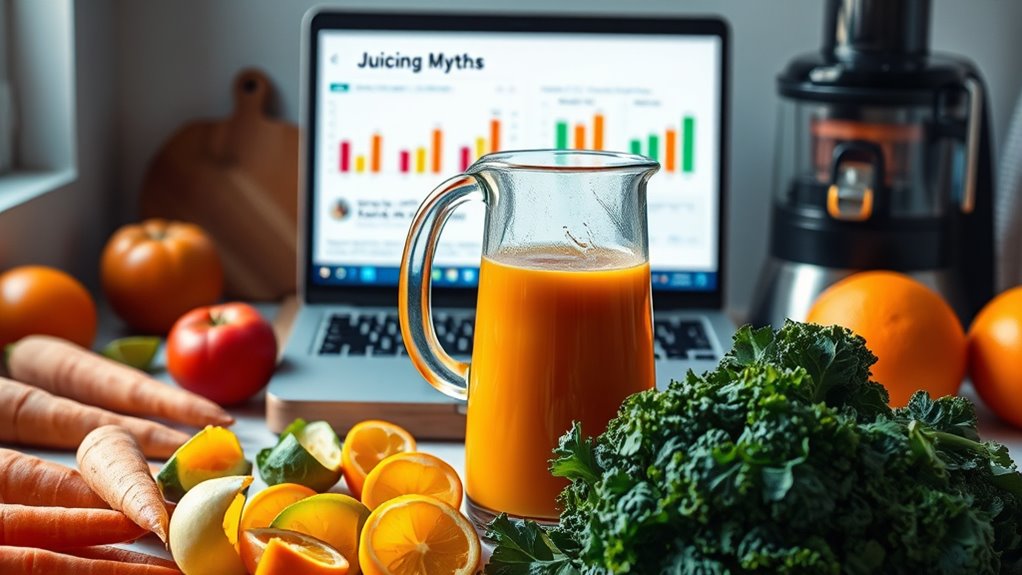
While juicing can boost your intake of fruits and vegetables, it often makes nutrient absorption more challenging. You may also consume more sugar than you realize, which can undermine your long-term health goals. Understanding these limitations helps you make smarter choices for lasting wellness.
Nutrient Absorption Challenges
Although juicing can quickly pack a variety of nutrients into a single glass, your body may not absorb all of them efficiently. One challenge is fiber degradation, which reduces the beneficial effects of whole fruits and vegetables. Without fiber, your digestion can be less effective at releasing minerals, lowering mineral bioavailability. To understand this better, consider:
- Reduced fiber means fewer benefits from gut health and slower digestion.
- Lower mineral bioavailability limits how much your body can use essential nutrients like calcium and iron.
- Enzyme loss during juicing can hinder nutrient absorption, making some vitamins less accessible.
These factors highlight that, despite the nutrient density, juicing might not maximize long-term wellness due to absorption issues.
Sugar Content Concerns
Even though juicing captures the natural sweetness of fruits and vegetables, it can substantially increase your sugar intake without you realizing it. Fruit sugar, primarily in the form of natural sugars, can add up quickly in a juice, leading to a higher glycemic impact than eating whole produce. This rapid sugar absorption can cause blood sugar spikes, which may affect your long-term wellness, especially if consumed excessively. Relying solely on juice might mask the true sugar content, making it easy to overconsume. To keep your sugar intake in check, consider balancing your juices with fiber-rich foods or limiting fruit-heavy blends. Being aware of the glycemic impact helps you enjoy juicing without compromising your health goals.
Frequently Asked Questions
Can Juicing Help Prevent Chronic Diseases Effectively?
You might wonder if juicing can help prevent chronic diseases. While juice provides antioxidant benefits and boosts nutrient density, it shouldn’t replace whole fruits and vegetables. Juicing offers quick access to vitamins and antioxidants that support your health, but a balanced diet is essential. Relying solely on juice isn’t enough—combine it with other healthy habits for effective disease prevention.
Does Juicing Replace the Need for Whole Fruits and Vegetables?
You might think juicing replaces whole fruits and vegetables, but it doesn’t. Juicing causes fiber loss, which is essential for digestion and blood sugar control. Plus, the absence of fiber affects nutrient absorption, making some vitamins less available to your body. To get the full benefits, include whole produce in your diet alongside juices. This way, you enjoy fiber and ideal nutrient absorption for better health.
Are There Any Hidden Additives in Commercial Juices?
You might wonder if commercial juices hide additives. Additive concerns are valid since some brands include preservatives, flavorings, or sweeteners. To avoid them, check ingredient transparency on labels carefully. Opt for juices labeled as 100% fruit or vegetable, and choose organic options when possible. Being vigilant helps you enjoy juice without unwanted additives and guarantees you’re making healthier choices aligned with your preferences.
How Does Juicing Impact Blood Sugar Levels in Diabetics?
When it comes to juicing and diabetes, you need to watch your blood sugar fluctuations. Juicing can cause quick spikes because of high sugar content, which impacts your insulin response. It’s like playing with fire—if you don’t monitor your intake, your levels can get out of control. Stick to low-sugar fruits and vegetables, and always check your blood sugar to keep things balanced and avoid surprises.
Is Homemade Juicing Safer Than Store-Bought Options?
You might wonder if homemade juicing is safer than store-bought options. Homemade preservation allows you to control ingredients, reducing the risk of added sugars and preservatives. On the other hand, store brand contamination is a concern due to potential bacteria or spoilage. By juicing at home, you minimize these risks and enjoy fresh, nutrient-rich drinks without the uncertainties linked to commercial products.
Conclusion
Now that you’ve navigated the nuances of juicing myths, it’s clear that moderation and mindful choices make the most of your fruit-filled endeavors. Don’t fall for false promises or flashy fads—focus on facts, fiber, and balance. By understanding the truths behind juicing, you can craft clever, conscious choices that genuinely boost your health. So, steer clear of scams, savor smoothies, and stay smart—your wellness wins with wise, well-informed ways!
